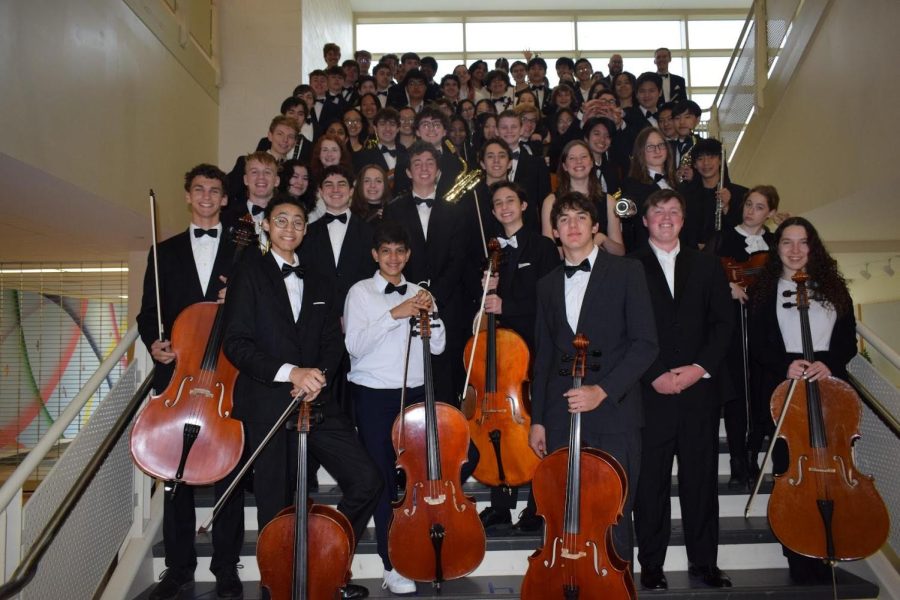District Disparities: The Struggle to Support Music
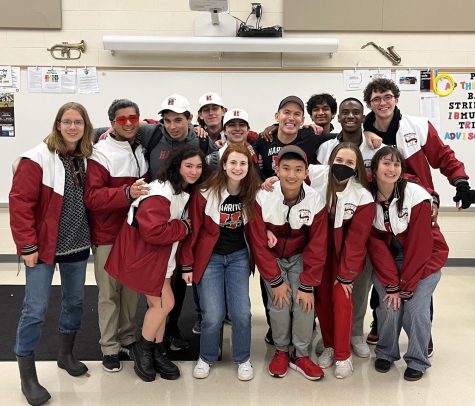
When I look back at my high school experience as graduation quickly approaches, the community which I was most prevalently a part of was the music community – a community which had a fundamental impact on my four years at Harriton. While people tend to poke fun at the often-nicknamed “band kids,” these students actually make up a community which is incredibly unique and cannot be overlooked; the ensemble structure of classes like band, orchestra, and choir create strong and special relationships, where the most unlikely of friends learn to work together and find their place. I have gained so much from being a part of the music community: musical skills of course, but also amazing friends and connections with teachers who I went to if I ever needed anything – we all knew that Mr. Joseph’s door was always open. Playing in a community where everyone builds each other up helped increase my own self-confidence; I can see all the ways I have grown, in many different aspects of my life, from my time in the music department, and I know I am not the only one.
The impact of the arts on students is something which is constantly underappreciated, when in truth there is so much to be learned and gained from an education in music, art, and more. For instance, influential Supreme Court Justice Ruth Bader Ginsburg bonded with justices of completely opposite ideologies as herself by attending the opera together. And more recently, President Joe Biden and South Korean President Yoon Suk Yeol shared a fun moment as the later sang “American Pie”, creating good relations between the two allies. These are only a few examples of the critical role the arts can play – in politics, interpersonal relationships, and so much more.
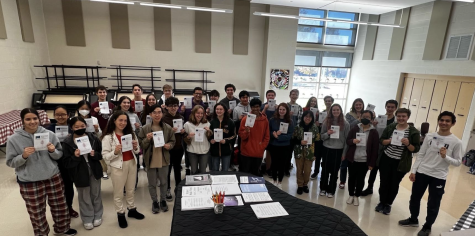
Despite all these potential benefits, the arts are undeniably undersupported and underappreciated – including at Harriton. The music community often goes unnoticed in our school, despite how much we give to Harriton: the pep band plays at every football game throughout the fall, the drumline (“Ramchops”) brings the pep to our pep rallies, “Combo” graces our halls with music on Fridays and Move Up Days. And yet, getting classes such as band, orchestra, percussion, and choir into our schedules is incredibly difficult; the number of times I have asked peers why they are no longer in class and received the answer that it was not possible due to their schedule was overwhelming. Beyond those classes, groups such as jazz band, orchestra winds, chamber ensemble, percussion ensemble, vocal ensemble, Pitch Please, Tri-M Music Honor Society, and more, have to scramble to find time to meet during lunch and learn or after school, which is not nearly enough time to cover all of the learning that needs to be done, and not possible for many students – due to transportation issues, needing the time to meet with teachers, and more. While our music teachers have pushed for more support from the district to address these issues, they have been continuously ignored.
When considering this, I wondered whether this lack of support for the music program was only apparent at Harriton, or Lower Merion School District, or whether this was felt elsewhere. I interviewed 4 music teachers from 4 different school districts: Mr. James Joseph, music director at Harriton High School; Mr. Adam Search, music director at Great Valley Middle School in Malvern, PA; Mr. William Seaton, music director who teaches grades 6, 7, and 8 general music classes, as well as 7/8 Band, 7th and 8th grade Orchestra, and Jazz Band, in the Tredyffrin-Easttown “TE” School District; and Mr. Andrew Urbina, music director from the Radnor Middle School music department, to learn more about the struggles facing music programs in our district and districts nearby.
The Harriton Banner: How long have you been working in the music department at your school/district, or at schools/districts throughout the area? How would you describe your experience in this position(s)?
James Joseph: 31 years. Pandemic aside, I do not regret the teaching profession I chose as a career. I believe teaching is a ‘calling’ and I am grateful to have had the opportunity to serve for so long.
Adam Search: 31 years, all at Great Valley…. I like my school, my students and I feel like I am a valued member of the staff…. I believe the best music teachers are always learning, working on the craft of teaching and continuing to improve as musicians. I think 31 years has taught me a lot and I try to learn more each day.
William Seaton: I have been fortunate to teach in TESD for the past 19 years. I have taught at the middle school for 13 years (split fall 2004 – spring 2007 and fall 2013 – present) and I taught at Conestoga High School for 6 years from fall 2007 – spring 2012.
Andrew Urbina: I have been at Radnor School District for 2 ½ years. I have had a great experience at my school district. My music colleagues, administration, and all other staff members have been cooperative and supportive to the music department.
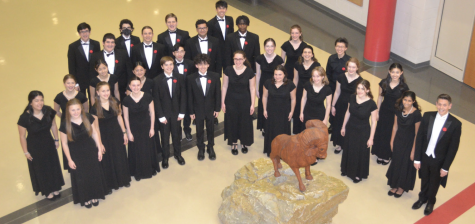
THB: Would you describe the administration at your school as dedicated to the music program? Do you feel that there is enough of a focus on music, or is it seen as less important than other activities or courses?
JJ: I feel there is great room for improvement. Support for music comes from many places: Locally, it stems from the community, district-level administration, and building-based administration, [however] there seems to be an inherent disconnect between these three entities. I believe our community values the arts and wants robust music programs in our schools. However, the desire for this far exceeds the effort taken to make sure this occurs equally and effectively in each building. Leaders put in place to support such programs seem over-extended, and not able to acknowledge/address the inconsistencies in music instruction among the buildings. I do feel as if Music is less important than other activities/courses.
AS: I feel that my building principal values me as a staff member in the building and that music is seen as an important part of our curricular and extracurricular offerings. Sometimes I do not feel supported by District level administration and feel that music is seen as less important by them and a subject that could be given less time and attention to.
WS: Yes, the administration is very dedicated to the music program in TESD. Support for music has been strong throughout my 19-year career. We are supported financially and scheduling-wise. The schedule permits small group sectionals (pull-out lessons) to occur with our instrumentalists in grades 5 – 8 once per week for 30 minutes on a rotating schedule. Our trips and performances are supported and encouraged, and our administration willingly and happily attends our concerts. Several members of our administration are musicians themselves and will often join the students during small group lessons and/or concert performances to participate as performing musicians.
AU: Yes, the administration supports the music department; however, music is a challenge to schedule for students. Music competes with other electives and integrated programs making it difficult for students to fit it in their schedule.
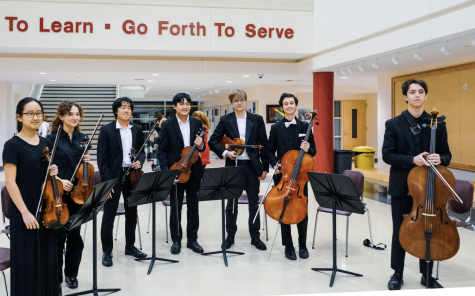
THB: Has scheduling been a challenge for your students? Are music classes/programs easily accessible or difficult to participate in?
JJ: The scheduling practices (particularly in my own building) are a perfect example of how music is not a priority. A thriving Music program is typically designed so that students wanting those courses get scheduled FIRST, not last, or near-last. This practice ensures a consistent 4-year continuum among performing groups. Most Music programs are made up singleton sections of courses. By fulfilling these sections with students who want to be in them FIRST, or near-first, this would ensure growth in the program, not gaps of participation year-after-year. When groups of students can’t get into these music courses, this weakens the ability to maintain/grow the program for future years. Inconsistencies among scheduling practices in both high schools also create inequities for the students who take music courses. If one high school has a culture where music is scheduled the way it should be (consistently at the same time, year after year, with the majority of students who want to be in them), and the other high school does not, then music students—especially those who have a choice–will choose the consistent program with the proactive scheduling practices.
AS: Yes, they are accessible for students at the middle school who want to participate in them.
WS: Scheduling at the middle school level has not been difficult but does have some accessibility issues concerning participation in music ensembles. Music ensembles (band, orchestra, chorus, jazz band) for students in grades 5 – 8 rehearse in the morning before school begins and requires that families of interested students arrange for transportation to the school on rehearsal days. General music classes are required for all students in grades 5 – 8 with students in grades 5 and 6 receiving instruction for 45-minute classes 2 of every 6 days in a cycle for the year and students in grades 7 and 8 receiving instruction for 45-minute classes 2 of every 6 days in a cycle for a semester.
AU: Scheduling has been a challenge for students. Rehearsals for ensembles are both before and after school making it difficult for students because of transportation, academic support classes, and other club meetings. Pull-out lessons also interrupt other classes during the school day and vice versa which further puts students in the middle to choose which class is more important.

THB: How has COVID impacted your music program or the music programs in your district?
JJ: The pandemic was handled differently in the middle schools. One middle school (Bala Cynwyd) tried to preserve whatever level of instrumental music instruction was possible/safe. The other middle school (Welsh Valley) literally stopped instrumental music instruction/singing and lumped students into a general music situation. This has and will have a profound effect on not only the ability of our incoming musicians, but the sheer number of instrumental musicians has decreased.
AS: Our numbers are down and the level of musicianship of students continues to be under where it was pre-pandemic. It’s coming back but will still take a few more years to get there.
WS: As a result of COVID, we saw a drastic reduction in the number of students who chose to participate in music ensembles. This makes sense as learning an instrument as a young beginner is exceptionally difficult without in-person instruction. There is a noticeable gap in the ability in skill level of students who were participating during COVID and the students who started instruction with in-person learning before or after virtual instruction took place. That gap is narrowing with in-person instruction, but it still exists. Thankfully, we have fully recovered with regard to beginning students and each class has a large number of student musicians who have started participation in music ensembles each year post-virtual instruction.
AU: COVID has impacted the music programs at RMS. It was a challenge to maintain student numbers in both chorus and band. This current school year ensemble numbers are doing better; however, the musicianship and instrumental fundamentals were also impacted because of the lost instructional time.
THB: In what ways could the administration (or others) at your school/district improve their support of the music program?
JJ: Schedule Music FIRST. Music Education research shows this is the number one action that can poise a school for a consistent/thriving music program.
AS: Continue to value input from music teachers.
WS: There’s not much to discuss as support has always been very strong. If anything, I would suggest that scheduling ensembles meet during the school day which would allow students to participate in band, orchestra, jazz, and chorus even if school bus transportation is their only option for getting to school.
AU: Continue to communicate with music staff members.
THB: Do you have any further comments to share with the readers of the paper?
JJ: Our own music faculty has made the case for higher priority scheduling practices for many years. It has been ignored. The challenges presented to us due to the scheduling practices in our building has made our jobs unnecessarily more difficult.
While our four sources have all had different experiences, some receiving overwhelming support and some underwhelming, all four mentioned struggles: from scheduling difficulties, to the lack of accessibility of musical extracurriculars, to the unanimous agreement that the COVID-19 pandemic had a strong negative impact on music departments in each district, it is clear that there is much to be done to better support music in districts state-wide – probably nationally. It is also clear that more needs to be done to support our music directors, like those interviewed above, who work tirelessly to support their students, instruct kids on dozens of different instruments, lead musical extracurriculars before and after school hours, and teach classes ranging from band and orchestra to AP and IB Music, Music Theory, and so much more.
Of course, there is much that remains unsaid. Disparities between music departments do not only exist between districts, but also between schools within districts. All music is not created equal in our own Lower Merion School District. For instance, Lower Merion High School does not have a pep band like Harriton High Scool does, however Harriton does not have scheduled vocal ensemble and percussion ensemble classes like Lower Merion does. In the end, there needs to be more support and more of a focus on music in every school in our district, and every district overall. That support can begin with reaching out to teachers to ask what can be done to help, especially in this challenging period after COVID, and increase over time, including: changing the focus when scheduling, working more music classes and programs into the school day, and overall focusing more on the arts.
I cannot stress enough how important music programs are – these communities mean so much to the kids in them, and they offer so much knowledge to gain: from musical skills to teamwork, confidence to focus, friendships to mentorships, and so much more. I know that my high school experience would not have been the same without the music program and the community which I am so grateful to have been a part of, despite the scheduling challenges I faced to be able to do so.
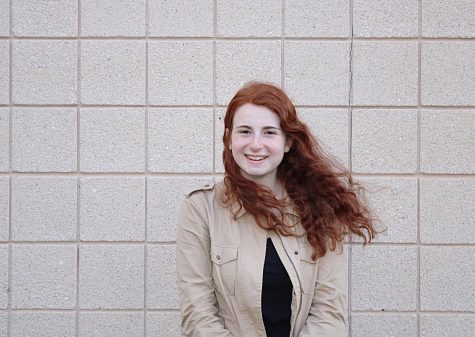
Jenna, an IB senior, is so excited for her fourth and final year at The Harriton Banner, this year as Executive Editor. Along with writing articles, Jenna...


